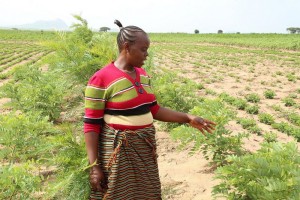 The Africa Rising Project of the World Agroforestry Centre has successfully changed the beliefs and misconceptions of farmers in Tanzania’s Kongwa and Kiteto Districts. The belief that trees could suck away nutrients from food crops has now been erased with farmers now enjoying the benefits of intercropping multipurpose trees with their crops. Additionally, the project is establishing various landscape based agroforestry practices to improve access to fodder, fuel wood and control soil erosion in Tanzania.
The Africa Rising Project of the World Agroforestry Centre has successfully changed the beliefs and misconceptions of farmers in Tanzania’s Kongwa and Kiteto Districts. The belief that trees could suck away nutrients from food crops has now been erased with farmers now enjoying the benefits of intercropping multipurpose trees with their crops. Additionally, the project is establishing various landscape based agroforestry practices to improve access to fodder, fuel wood and control soil erosion in Tanzania.
Yearly Archives: 2015
Barking up the right tree
Trees grow ‘like children’
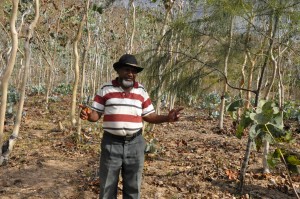 Manuel, a proponent of FMNR in Timor-Leste likens trees to children who must be considered and treated well. Not holding back his joy, Manuel shares his great experience as an implementer of the practice having received training through the Building Resilience to a Change and Environment (BRACCE) Project.
Manuel, a proponent of FMNR in Timor-Leste likens trees to children who must be considered and treated well. Not holding back his joy, Manuel shares his great experience as an implementer of the practice having received training through the Building Resilience to a Change and Environment (BRACCE) Project.
Project initiated to build resilient farming systems
 A large-scale project that seeks to help smallholders adapt to climate change by practicing agricultural systems that integrate tree planting, rearing of livestock and crop production has begun in West Africa. the Building Resilient Agro-forestry Pastoral Systems through Participatory Action Research (BRAS-PAR) project aims to improve the understanding of farmers’ perceptions and demands by addressing barriers to technology adoption while taking into consideration gender and social differentiation.
A large-scale project that seeks to help smallholders adapt to climate change by practicing agricultural systems that integrate tree planting, rearing of livestock and crop production has begun in West Africa. the Building Resilient Agro-forestry Pastoral Systems through Participatory Action Research (BRAS-PAR) project aims to improve the understanding of farmers’ perceptions and demands by addressing barriers to technology adoption while taking into consideration gender and social differentiation.
Where Africa youth fit into the future of agriculture?
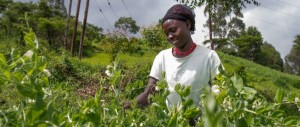 Increasing the participation of youth in agriculture is a global challenge. Yet it remains particularly perplexing within an African context, given the growing demand for food supply and emerging diversity in diet nutrition.
Increasing the participation of youth in agriculture is a global challenge. Yet it remains particularly perplexing within an African context, given the growing demand for food supply and emerging diversity in diet nutrition.
Marion Moon, founder and managing director of Wanda Organic Limited, considers the lack of appeal of employment in agriculture as failure to consider the market and how to meet (and create) market demands along the supply chain.
The unexploited solution according to Ms. Moon, however, lies within our reach. That is, packaging and commercializing agricultural innovations in stimulating and incentivized ways. As a result, there are a number of opportunities to have youth pursuing agriculture as a viable venture for economic development and innovators in this field should:
• Introduce competitive activities whereby users will receive prices at the end
• Provide technical assistance on the innovation making it sensible to the market
• Provide technical assistance on the business e.g. IT needs
• Brand products in simple and enticing ways
• Explain the cash flow
• Practice contract farming through ready markets and supply chains
• Make the innovation very efficient through technology such as mobile applications
• Pitch the innovation based on what people want at the moment
• Establish partnerships along the chain
• Simply state the diverse benefits and immediate returns
 According to Ms. Moon, this way government, national and international NGOs and various projects will develop business plans that will ensure uptake of their innovations based on great marketing techniques. In the same manner, the youth will be well advised on the most viable tree species based on their desire to have quick cash flow at their convenience.
According to Ms. Moon, this way government, national and international NGOs and various projects will develop business plans that will ensure uptake of their innovations based on great marketing techniques. In the same manner, the youth will be well advised on the most viable tree species based on their desire to have quick cash flow at their convenience.
Dreaming of an Evergreen future for the DRC
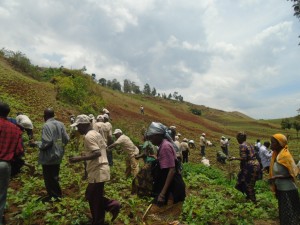 At the start of this year, Patrick Kaka dreamt of trees for his community in eastern Democratic Republic of Congo (DRC), and lots of them!
At the start of this year, Patrick Kaka dreamt of trees for his community in eastern Democratic Republic of Congo (DRC), and lots of them!
Despite some initial challenges with missed funding opportunities and a quick trip across the border to Burundi to get tree seedlings, Patrick was able to realize his dream in early October. This was through the inauguration of a National Tree Day (Arbor Day equivalent) for his home community on the shores of Lake Kivu, eastern boarder of the DRC. Through his NGO, GIERI (Groupe d’Intervention Pour l’Encadrement Et La Rehabilitation Integral or Intervention Group for Farming and Integral Rehabilitation), Patrick was able to access some support from GIZ and work his community through a Landcare approach, to embark on the start of his EverGreen Agriculture dream for eastern DRC.
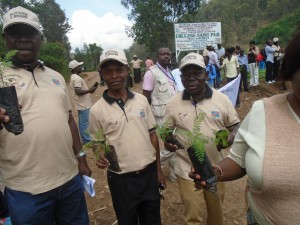 In what is considered a first for the region, the tree-planting day on the 8th October 2015 attracted the participation of the Provincial Minister of Agriculture, the military and local residents, to plant over 5,000 agroforestry species, including Faidherbia, Gliricidia and Eucalyptus, within farmer fields near Bukavu.
In what is considered a first for the region, the tree-planting day on the 8th October 2015 attracted the participation of the Provincial Minister of Agriculture, the military and local residents, to plant over 5,000 agroforestry species, including Faidherbia, Gliricidia and Eucalyptus, within farmer fields near Bukavu.
Patrick commented that the focus of the day was to raise awareness amongst the community of the importance of trees for both environmental protection and household livelihoods. He added that the participating community were grateful for the integration of trees and shrubs directly into their agricultural fields which will increase the productivity, income and resilience of their farming systems.
The planning and implementation of the tree planting program was heavily reliant on the community adopting a Landcare approach to their activities, through instilling ownership and management of the natural resource amongst the community. Patrick noted that creating public awareness of the tree planting activities through a participatory framework was a key driver, in addition to engaging other relevant partners, such as the local authorities to support environmental management initiatives on private lands.
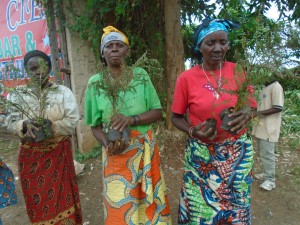 When asked what the future challenges for communities in eastern DRC were, Patrick noted that “farmers in our community need guidance in technical skills for nursery management and species diversity for high-yielding species inter-cropped in farming land. We also need enabling policies and incentives to invest in environmental services that protect biodiversity, sustainable land and water management around Lake Kivu”.
When asked what the future challenges for communities in eastern DRC were, Patrick noted that “farmers in our community need guidance in technical skills for nursery management and species diversity for high-yielding species inter-cropped in farming land. We also need enabling policies and incentives to invest in environmental services that protect biodiversity, sustainable land and water management around Lake Kivu”.
African farmers turn to climate-smart agriculture
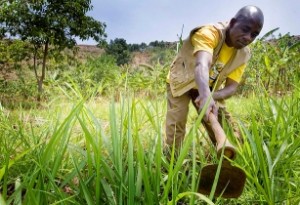 Integrating trees, crops and livestock into farming systems translates to drought resilient, productive and sustainable systems. This innovation has drawn the attention of farmers, cultivating new trees in their farms for the purpose of providing fodder, fuel, food as well as other domestic needs. With ample training on these technologies and support from relevant institutions, farmers’ dependency on rangelands and frustrations on low productivity levels reduces as experienced in diverse African nations.
Integrating trees, crops and livestock into farming systems translates to drought resilient, productive and sustainable systems. This innovation has drawn the attention of farmers, cultivating new trees in their farms for the purpose of providing fodder, fuel, food as well as other domestic needs. With ample training on these technologies and support from relevant institutions, farmers’ dependency on rangelands and frustrations on low productivity levels reduces as experienced in diverse African nations.

